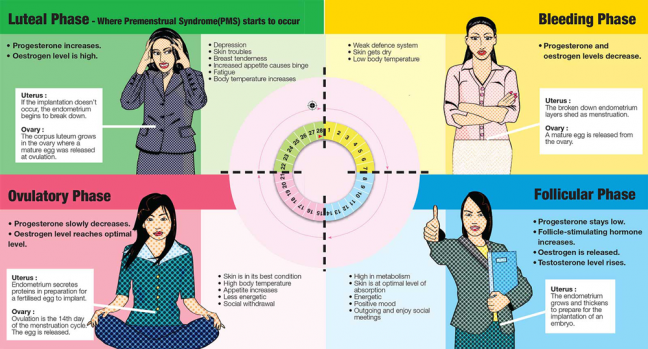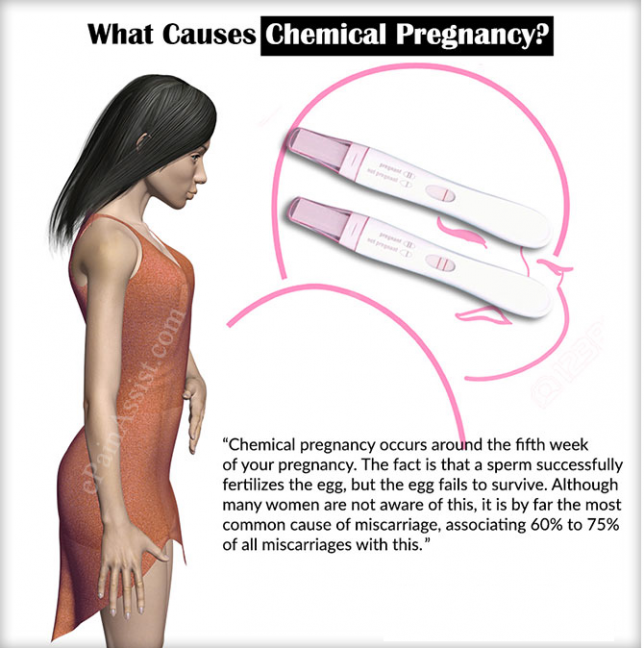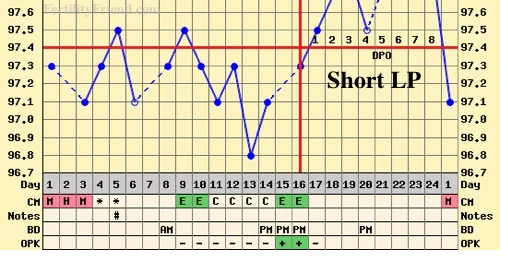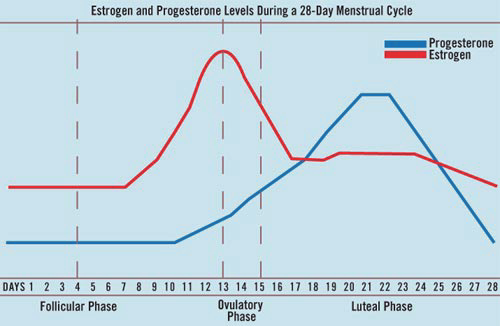![]() The information provided by our expert should not constitute a diagnosis of your condition. Always consult a medical practitioner or healthcare provider for a formal diagnosis. By making use of this content, you agree that ConceiveEasy and the expert assume no liability.
The information provided by our expert should not constitute a diagnosis of your condition. Always consult a medical practitioner or healthcare provider for a formal diagnosis. By making use of this content, you agree that ConceiveEasy and the expert assume no liability.
If you are trying to conceive and you have been on pregnancy message boards, or are in Facebook groups geared for those who are trying for a baby- you probably have read messages in these groups or on these boards about the luteal phase.
You may wonder what that even is and why it is such a big deal since there are many discussions that revolve around this. Claim Your 20 Free Pregnancy Tests – Click Here
The luteal phase is the timeframe from which starts from the time after you ovulate and goes to the day when you get your period. In other words, it is the second half of the cycle. And before you started embarking on the TTC journey, you probably never even paid any attention to this phase of your cycle, or even cared.
In fact, you may not even know that your cycle has different phases but now you have the opportunity to learn. Here are the four phases of your menstrual cycle:
• The menstrual phase – It is the phase when you have your period which lasts from day 1 to 5.
• The follicular phase – This is the time frame after your period ends and your follicle matures, and the timeframe can vary a little. However, it starts from day 1 of the menstrual phase and ends at the time of ovulation which can happen anywhere from day 14 to day 21 if the cycles are longer.
Sometimes it can last for only a week since it is possible for women to ovulate on day 7 of their cycles too. This is also the time when you are charting your cycle while trying to conceive.
You are either checking your cervical mucus consistency or if you know you are getting closer to ovulating based on the fact that you took your BBT at this time in the past to get to know your cycles- you may be using ovulation prediction kits to determine how close you are to ovulation. Towards the end of your follicular phase is when it is time to have intercourse to maximize your chances of conceiving.

• The ovulation phase – This is the time when you literally are ovulating and that is when the follicular phase ends since the egg is mature enough to be released. That day can be anywhere from day 14 to day 21, as it depends on the cycle. If the cycle is short, it can be as early as day 7.
You don’t want to start having intercourse at this time because once the egg has been released, it will only stay good for 12 to 24 hours. The best time again to have intercourse is, again, at the end of your follicular phase.
• The luteal phase – This is the period after ovulation has happened until the menstrual phase begins. In the majority cases, this phase can last anywhere between 10 to 16 days. If you have been trying to get pregnant, this is the time that you will also refer to as the waiting period when it comes to taking the test.
This is the time to keep yourself distracted otherwise, you will worry whether you conceived or not! However, if your luteal phase is under 10 days, then that is going to be problematic for your fertility. And many women who have been trying to get pregnant for a long time may make this discovery on their own.
They may have already seen that the problem with their luteal phase was there if they charted their cycles by taking their BBT from the past, but did not pay attention to it. That is until they looked at their graphs and noticed that they would ovulate on day 18 but then they saw that they would get their periods on day 27.
That means that they have a 9-day luteal phase which is very short, and the reason that this is a problem is that there is not enough time for the embryo to implant. Therefore, these women may not have had any trouble with conceiving, but end up having an early miscarriage without knowing and would end up losing the embryo during menstruation. The name for that is a chemical pregnancy since it is a pregnancy loss before being 5 weeks pregnant.

Now you are probably wondering if you are ovulating properly, then your hormones must be in check. However, why is it possible to not have any problems with ovulating but still have a problem with your cycle anyway. Let’s now talk about the cause for a short luteal phase.

You may have normal levels of estrogen and your follicle stimulating hormone, as well as the luteinizing hormone, may be working fine. The problem is that you are not producing enough progesterone if your luteal phase is short.
What happens is that after you ovulate, the follicle that held your egg collapses and turns into what is known as the corpus luteum, and it begins to produce progesterone. The progesterone is a crucial hormone that is needed to help thicken your uterine lining so that in case you do get pregnant, the embryo is able to implant properly on the lining.
However, if there is no embryo implanting, then by the end of the luteal phase, the corpus luteum stops producing progesterone. At that point is when the uterine lining begins to shed and that is the start of your menstruation phase.
Therefore, even though whenever you think about pregnancy, you may think about the sperm uniting with the egg creating an embryo. However, pregnancy does not happen until the embryo properly implants in the uterine lining.
That is when the hCG hormone becomes detectable and that is when you would get a positive pregnancy test. That said, in order for implantation to successfully happen, you need to have enough progesterone.
Implantation on average happens around 9 days after conception but it can happen as early as a week or as late as 12 days after the fact. This is why it is crucial to have a luteal phase that is at least 10 days long. The ideal time period for the luteal phase would be 14 days.
Even if implantation is successful, if you are still not producing enough progesterone in your body, due to this reason you are at risk for having a miscarriage.

Even if you are not trying to conceive, you still need to worry about whether or not your luteal phase is the average length. That is because if you are not making enough progesterone, even while not trying to conceive- your bone and heart health will be negatively impacted by not having enough progesterone in your body.
Not having enough progesterone can also affect how well you sleep and how you feel overall. Additionally, the lack of the hormone can also be a contributing factor to mental illnesses such as depression and anxiety.
Now you may be wondering how often this is a problem for women, and what the contributing factors could be for a woman to have a short luteal phase. Let’s find out.

There are many reasons why women are not producing enough progesterone, let’s find them out here:
• Thyroid disorders – if your thyroid hormones are out of whack, this will get into the way of your progesterone production and if you are aware that you have a thyroid problem, you will need to have your progesterone levels checked to see if they are affected.
• Polycystic ovarian syndrome (PCOS) – When it comes to PCOS, there is too much testosterone in a woman’s body which can have a negative impact on progesterone levels. This is one reason that many women who do get pregnant that have PCOS end up miscarrying even if their luteal phase is more or less normal.
• Obesity – If you have too much extra weight, that will create a hormonal imbalance and that also means your progesterone levels will be out of wack too.
• Anorexia or going on a restrictive diet – Even though it is important to lose weight if you are overweight, especially if you want to get pregnant and you want to get to an optimal weight, if you cut your caloric intake too much- that will cause your body to go in starvation mode.
You will not burn fat this way, and instead you will lose lean muscle mass and water and this will cause a hormonal imbalance. This is why it is important to see a dietician or nutritionist if you are wanting to lose weight because if you restrict your calories too much, you will end up with problems with your hormones and your health. The same obviously applies to anorexia.

• Exercising Excessively – If you are doing intense workouts everyday, you are stressing your body out and as a result, your hormone levels are going to be affected- including progesterone.
• Not getting enough exercise – If you are living a sedentary lifestyle, you will not be getting enough circulation that your body needs and your hormones will be impacted as well.
• Stress – Stress does a lot of damage to your body, and this is why it is important to find ways to manage daily stress like take meditation classes or yoga.
• Aging – It is a known fact as women age, their hormonal levels change and producing less progesterone is to be expected. One of the risks for getting pregnant in your late 30’s and 40 and over is having an early miscarriage due to low progesterone levels.
Now the question is, how do you know if your luteal phase is short and how to test for progesterone levels?

If you are concerned about your length of your luteal phase, especially if you happen to fall into any of the risk categories mentioned above- then the best thing to do is to track your cycles by taking your BBT each morning. Even if you are not trying to get pregnant it is a good idea to do that so you know how long your luteal phase is.
Once you track one cycle, look at the graph and see how many days after ovulation the temperature stays up until you get your period. If you see that the rise only lasts for 9 days or less, then there is a good chance that you have a luteal phase defect.
In order to confirm this, what you will want to do is go to your doctor a week after you have ovulated since progesterone levels are at its peak at that point to have your blood test done. If it has been confirmed that your progesterone levels are low, then you are facing this problem with not having enough of the hormone. But the good news, there are simple ways to fix this issue.

There are several excellent treatments for low progesterone and a luteal phase defect:
• Vitamin C supplements – It has been found that Vitamin C has been able to improve levels of progesterone and luteal phase defects. In fact, one study conducted indicated that 25% of women who took Vitamin C supplements to treat a luteal phase defect got pregnant within 6 months successfully of the treatment.
• Progesterone cream or supplements – If you know that you have a luteal phase defect, or suspect you, make sure you talk to your doctor about using cream or taking supplements. Your doctor can prescribe it but some creams are over the counter.
Just make sure that you only use the cream during your luteal phase and not your follicular phase. If you use it during your follicular phase, you will prevent ovulation from happening.
That all said, if you are trying to get pregnant but haven’t been able to conceive and you discovered it was because you have a short luteal phase- then the great news is that the treatment for this issue is easy!











Comments